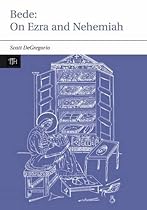Bede: On Ezra and Nehemiah (Translated Texts for Historians LUP)

| Author | : | |
| Rating | : | 4.85 (711 Votes) |
| Asin | : | 1846310016 |
| Format Type | : | paperback |
| Number of Pages | : | 208 Pages |
| Publish Date | : | 2014-11-28 |
| Language | : | English |
DESCRIPTION:
Scott DeGregorio is Assistant Professor of English Language and Literature in the Department of Humanities at University of Michigan - Dearborn. He is also editor of the forthcoming title Tradition and Innovation in the Writings of the Venerable Bede, ( Medieval European Series 7, West Virginia University Press) due for publication in 2006.. He has previously been published in a number of journals including Early Medieval Europe, Speculum and Traditio
"Review" according to Simon. Bede's commentary on Ezra and Nehemiah is filled, filled I say, with allegorical exegesis often fanciful, yet sometimes insightful. According to the introduction Bede's commentary on this part of the Scriptures is the earliest extant full commentary we have on them.The translator of this text often noted what he saw as a preoccupation with the state of the clergy manifesting itself in Bede's exegesis here.
Written. *Ezra and Nehemiah are two books of the Old Testament of the Bible, originally one work in the Hebrew canon. The Venerable Bede's In Ezram et Neemiam* is the first and only complete commentary written on these biblical books in either the patristic or later medieval era. As the Introduction argues, this work of Bede's is an excellent example of the allegorical method of biblical interpretation which Bede inherited from the Fathers of the Church and for which he himself is justly famed. By making this text available in English for the first time
He has previously been published in a number of journals including Early Medieval Europe, Speculum and Traditio. He is also editor of the forthcoming title Tradition and Innovation in the Writings of the Venerable Bede, ( Medieval European Series 7, West Virginia University Press) due for publication in 2006.. About the AuthorScott DeGregorio is Assistant Professor of English Language and Literature in the Department of Humanities at University of Michigan - Dearborn
